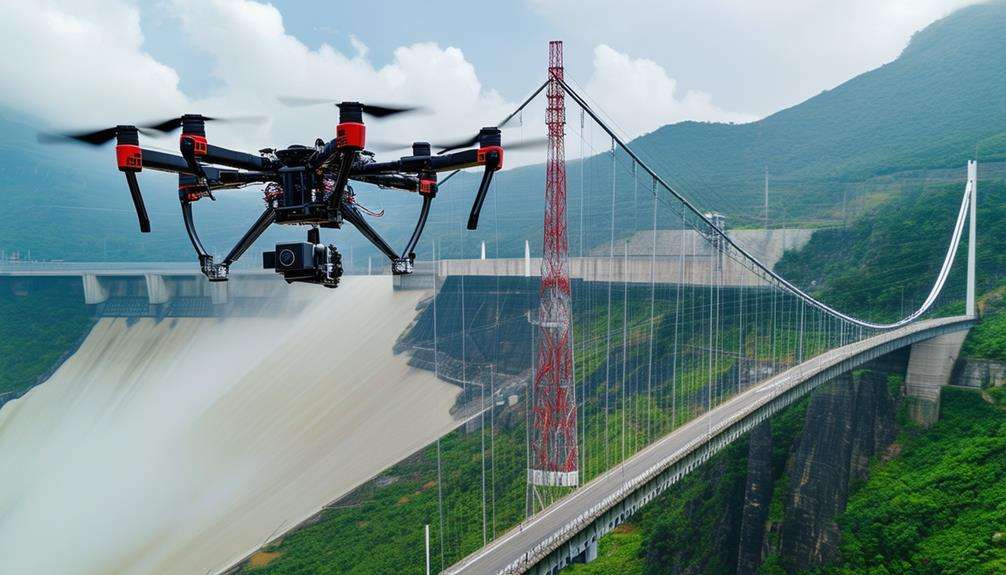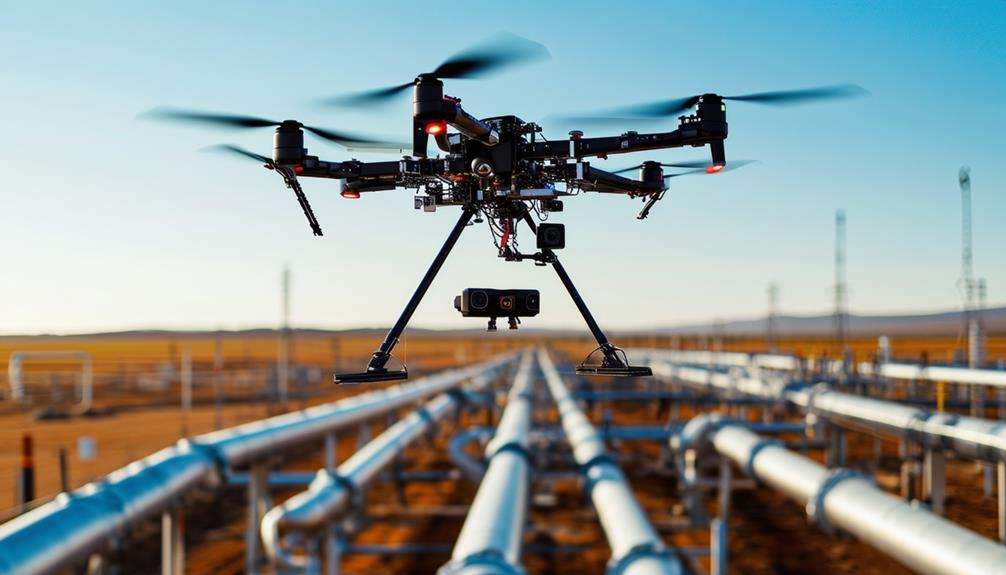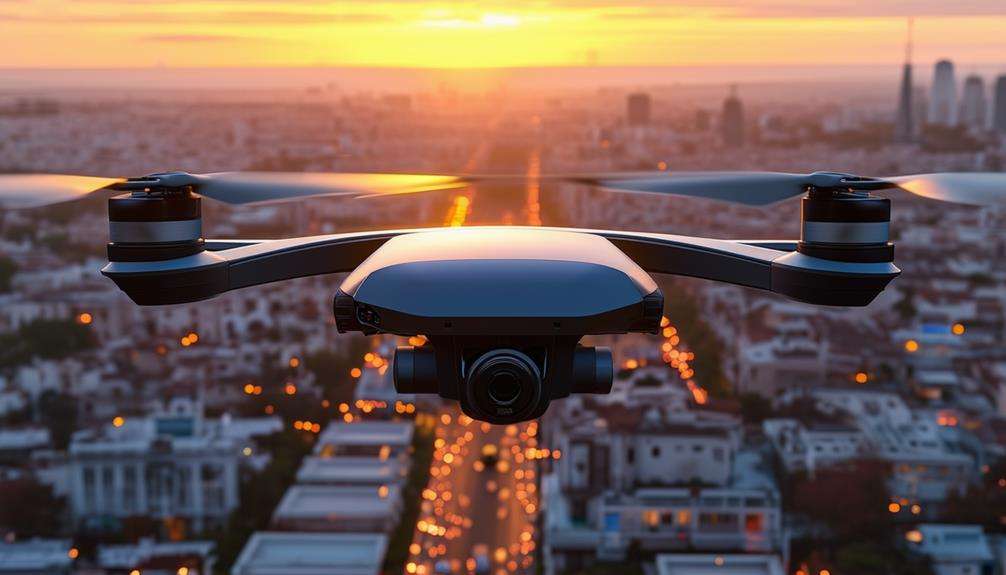How to Start a Commercial Drone Business
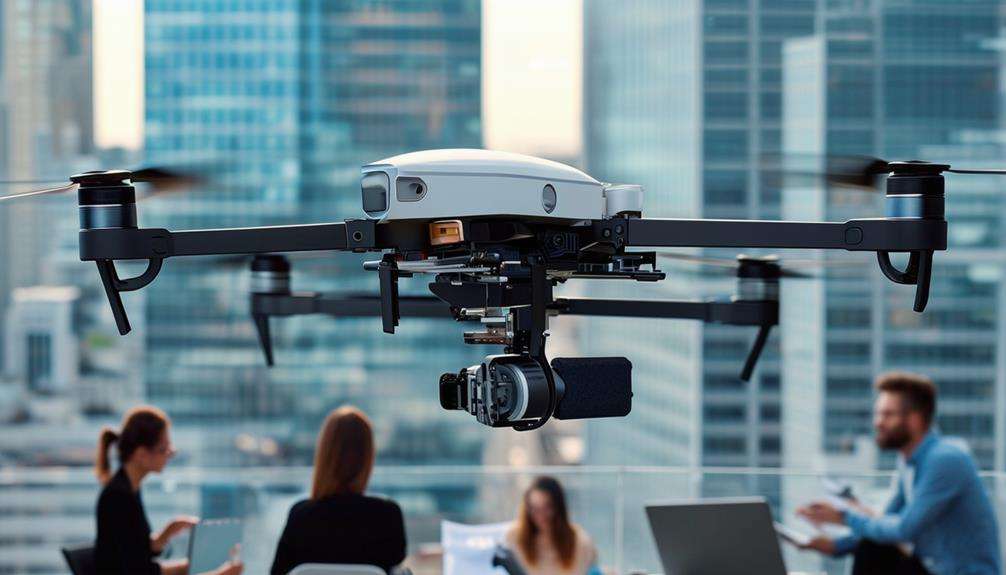
Starting a commercial drone business begins with obtaining your Part 107 certification, ensuring you are legally allowed to operate. Understanding and adhering to FAA regulations and airspace classifications is vital for compliance.
Selecting the right drone involves balancing your budget with the features necessary for the specific services you intend to offer. Establishing a solid business structure and securing the required insurance are also critical steps.
But how do you market your services effectively and expand your client base in this competitive field? Let's explore the essential steps to ensure your venture takes off smoothly.
Getting Certified

To kickstart your commercial drone business, you'll need to obtain your Part 107 certification from the FAA. This certification is essential for anyone aiming to become a commercial drone pilot.
To earn your Part 107 drone license, you must pass an aeronautical knowledge test and be at least 16 years old. The test covers various topics, including airspace classifications, drone regulations, weather, and emergency procedures.
Having a Part 107 certification demonstrates your understanding of FAA regulations, ensuring you operate your drone safely and legally. It's not just about passing the test; it's about committing to the standards set for commercial drone operations. Knowledge of these rules is critical, as non-compliance can lead to hefty fines and legal issues that could jeopardize your business.
Moreover, obtaining this certification shows your commitment to safety and professionalism to potential clients. It reassures them that you're a qualified and responsible operator. Numerous resources, including online courses and study guides, can help you prepare thoroughly. Once certified, you'll be well on your way to flying drones commercially and growing your business.
Choosing Your Drones
When choosing drones for your business, consider the specific requirements of your operations, your budget, and the essential features you need. Different drone models offer varying capabilities, such as high-resolution cameras and advanced obstacle avoidance systems. Assess the costs relative to these features to ensure you receive the best value for your investment.
Drone Type Selection
Choosing the right drones for your commercial business hinges on understanding your specific needs and the unique features each type offers. You need to take into account the various types of drones available and match them to the commercial services you plan to offer.
For instance, DJI dominates the market, offering models like the DJI Phantom for photography and the DJI Matrice for industrial inspections. Consider specialized models, such as fixed-wing drones for mapping and surveying, or quadcopters for aerial photography and videography.
Selecting drones with advanced features like obstacle avoidance, high-resolution cameras, and long battery life will enhance your operational capabilities and ensure you meet client expectations.
Here are three key considerations to keep in mind when choosing your drones:
- Maximize Client Satisfaction: High-resolution cameras and advanced features can impress clients and effectively meet their needs.
- Boost Operational Efficiency: Long battery life and reliable performance ensure task completion without unnecessary interruptions.
- Expand Service Offerings: Different types of drones allow you to diversify your services, from industrial inspections to stunning aerial photography.
Understanding the different drone types, their features, and capabilities is crucial for selecting the right drones to meet your commercial business needs. Make informed choices to position your business for success.
Budget and Costs
Once you've identified the types of drones that align with your commercial goals, it's crucial to consider the budget and associated costs. In the drone industry, prices can vary significantly. Beginner models might cost under $100, while advanced industrial drones can exceed $10,000. For a balance between affordability and functionality, consider drones like the DJI Mini 2, which cost under £500 and can be used commercially without formal training.
If your focus is on aerial photography and videography, investing in drones equipped with high-quality cameras is essential. While these drones are more expensive, the superior image and video quality can make your services more attractive to clients. Specialized industrial drones designed for agriculture or construction applications will also increase your initial investment.
Additionally, don't overlook the cost of drone insurance. Liability and hull insurance are critical for protecting your investment and covering potential damages. Including this in your budget is a wise move to ensure smooth operations.
Key Features Needed
Selecting the right drones for your commercial business hinges on understanding the key features that will best meet your operational needs. High-quality cameras are essential if you're venturing into professional aerial photography and videography. Consider models like the DJI Phantom series, which offer exceptional image and video clarity.
For extended commercial missions, drones with long battery life and stable flight capabilities, such as the Autel Robotics Evo II, are crucial. These features ensure you can complete your tasks without frequent interruptions.
Safety is another critical aspect. Drones equipped with obstacle avoidance sensors, like the Skydio 2, minimize the risk of crashes during complex operations. If your business focuses on industrial inspections or search-and-rescue missions, drones with thermal imaging capabilities, such as the DJI Mavic 2 Enterprise Dual, are indispensable.
Reliable GPS and intelligent flight modes, found in drones like the Yuneec Typhoon H Pro, are essential for accurate mapping and surveying tasks. Additionally, it's important to protect your investment through liability insurance, choose a memorable business name to stand out, and stay compliant by passing the Part 107 Test. Selecting drones with these features can significantly enhance your commercial business's efficiency and safety.
Building Your Business Structure
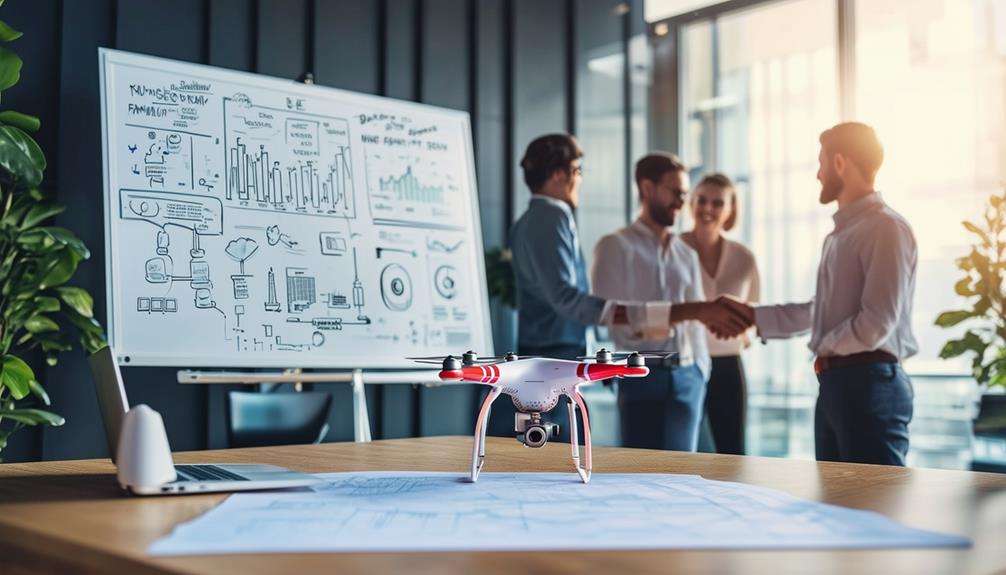
Establishing a solid business structure is essential for protecting your personal assets and maximizing tax benefits. Whether you choose a Limited Liability Company (LLC) or a Corporation, each offers distinct advantages tailored to different business needs.
An LLC is often favored for its flexibility and straightforward setup. To form an LLC, you need to file articles of organization with your state's business agency and pay a filing fee. Additionally, creating an operating agreement is crucial as it outlines ownership, management, and operational procedures.
Forming a Corporation, while more complex, can offer additional tax benefits. This process involves filing articles of incorporation and adhering to state-specific guidelines. Corporations also require bylaws to define roles and responsibilities within the business.
After deciding on your business structure, the next step is to obtain an Employer Identification Number (EIN) from the IRS. This number is essential for federal tax purposes and for opening a business bank account.
Choosing the right structure not only protects your personal assets but also lays a solid foundation for your commercial drone business. Take the time to thoroughly understand each option and consult with legal or financial advisors if necessary. This initial setup is critical for your long-term success.
Securing Insurance
Securing insurance is essential for safeguarding your commercial drone business against potential liabilities and financial setbacks. Without adequate coverage, a single incident could threaten the stability of your enterprise.
Drone insurance is a crucial requirement for commercial drone operations, and selecting the appropriate policy is pivotal. When seeking insurance, consider factors such as the type of drone you operate, the services you provide, and the necessary coverage limits.
Liability insurance is paramount as it shields you from claims related to damages or injuries caused by your drone operations. The cost of drone insurance typically ranges from $500 to $2,000 annually, depending on your specific coverage needs.
Ensure comprehensive protection by opting for policies that include:
- Drone Damage: Covers repair or replacement costs if your drone is damaged.
- Theft: Provides compensation if your drone is stolen, facilitating swift recovery.
- Third-Party Liabilities: Covers expenses related to third-party claims, such as property damage or personal injury.
Investing in the right insurance policy offers peace of mind, enabling you to focus on expanding your commercial drone business without the worry of unforeseen setbacks.
Marketing Your Services
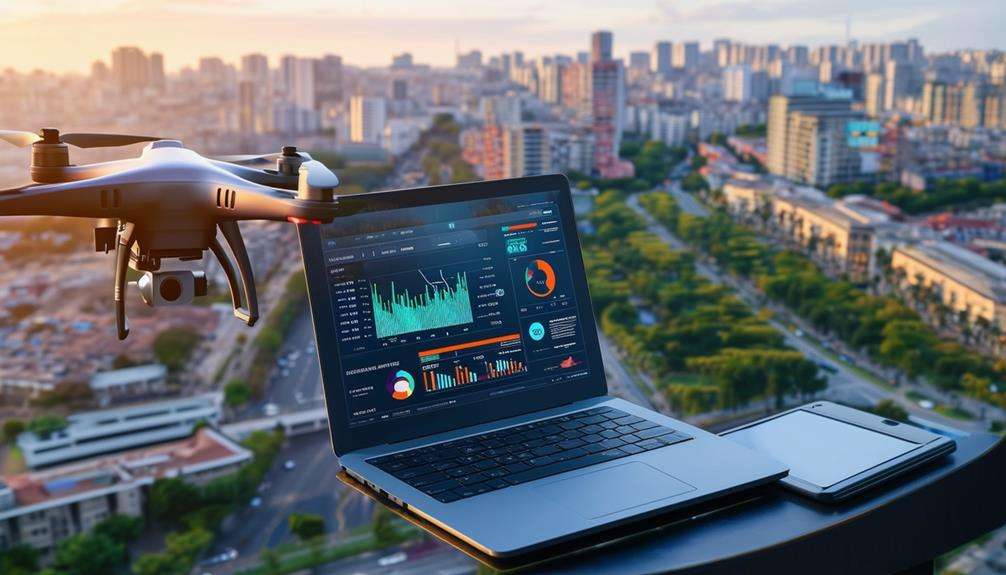
To effectively market your drone services, begin by identifying your target market to tailor your message accordingly. Leverage social media platforms such as Instagram and Facebook to showcase your work and connect with potential clients. Engaging content and strategic posts can significantly enhance your visibility and attract new business opportunities.
Identify Target Market
Identifying your target market is essential for effectively marketing your commercial drone services to the right audience. Focus on industries such as real estate, agriculture, construction, and insurance, as these sectors can significantly benefit from your offerings.
To understand your target market better, use data analytics to grasp customer needs and preferences. This will enable you to tailor your specialized services to meet specific demands. Highlight the benefits of your drone services—such as cost-effectiveness, efficiency, and high-quality results—in your targeted marketing campaigns.
Consider offering specialized services like thermal imaging, 3D mapping, or aerial inspections. These niche capabilities can differentiate you from competitors and attract clients with specific needs. By targeting your market and customizing your offerings, you can ensure your marketing efforts are both effective and efficient.
Identifying the right market can provide several benefits:
- Increased Engagement: Connect with clients who genuinely need your services.
- Higher Conversion Rates: Tailored services lead to more successful deals.
- Enhanced Reputation: Become a go-to expert in specialized niches.
Utilize Social Media
Showcasing your drone services on social media platforms like Instagram and Facebook can significantly expand your reach and attract new clients. These platforms are ideal for sharing stunning drone footage, behind-the-scenes insights, and client testimonials. By doing so, you can engage followers and potential clients, highlighting your expertise in aerial photography and videography.
To maximize the benefits of social media, utilize targeted ads to reach individuals specifically interested in your services. Collaborating with influencers or businesses in related industries can further broaden your audience. Regularly updating your profiles with fresh content keeps you top-of-mind for potential clients.
Here's a quick guide:
| Strategy | Action |
|---|---|
| Share Stunning Footage | Post high-quality drone videos and photos regularly. |
| Behind-the-Scenes Glimpses | Show the process and equipment you use. |
| Client Testimonials | Share positive reviews and success stories. |
| Utilize Targeted Ads | Run ads aimed at your ideal customer demographic. |
| Collaborate with Influencers | Partner with influencers to reach a broader audience. |
Engage with your followers by responding to comments and messages promptly. This builds a loyal community and demonstrates your commitment to excellent customer service. By effectively leveraging social media, you can significantly grow your commercial drone business.
Expanding Your Client Base
To expand your client base, leverage social media platforms like Instagram and Facebook to showcase your drone work. Post high-quality photos and videos of your projects to highlight your skills and attract potential clients impressed by your portfolio.
Broaden your reach by networking with local businesses, real estate agents, and event planners who often need aerial photography and videography services. Attend industry events, trade shows, and networking meetings to build personal connections that can lead to long-term business relationships.
Offer promotional discounts or packages to attract new clients and encourage repeat business. Special offers can entice clients to try your services and recognize their value. Collaborating with other professionals in related industries, such as photographers, can also help you reach a wider audience.
To evoke emotion and enthusiasm in your audience, focus on:
- Excitement: Capture breathtaking aerial views for high-profile events.
- Trust: Build a solid reputation by consistently delivering exceptional work.
- Opportunity: Discover new business opportunities by strategically expanding your client base.
Conclusion
Starting a commercial drone business is an exciting venture, but it's crucial to follow the right steps. Begin by obtaining your Part 107 certification from the Federal Aviation Administration (FAA), which is mandatory for commercial drone operations in the United States.
Next, choose the best drones that align with your specific business needs, whether it be aerial photography, surveying, or agricultural monitoring. Establish a solid business structure by registering your business, obtaining the necessary licenses, and setting up a financial system.
Don't forget to secure comprehensive insurance to protect your assets and operations. Additionally, develop effective marketing strategies to promote your services and attract clients. With these foundations in place, you'll be well on your way to expanding your client base and achieving success in the commercial drone industry. Happy flying!

